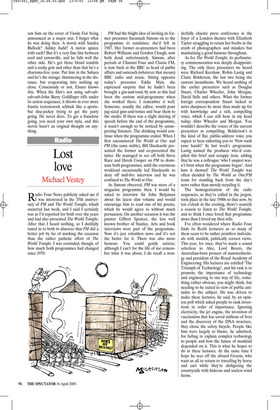Lost love
Michael Vestey
Radio Four News publicity asked me if I was interested in the 35th anniversary of PM and The World Tonight, which occurred last week, and I said I certainly was as I’d reported for both over the years and had also presented The World Tonight. After that I heard nothing, so I dutifully tuned in to both to discover that PM did a better job by far of marking the occasion than the rather pathetic effort of The World Tonight. I was reminded, though, of how much both programmes had changed since 1970. PM had the bright idea of inviting its former presenter Susannah Simons on to the programme to reminisce; she’d left in 1987. Her former co-presenters had been Robert Williams and Gordon Clough, now both dead, unfortunately. Simons, after periods at Channel Four and Classic FM, is now back at the BBC as head of public affairs and outreach (whatever that means) BBC radio and music. Sitting opposite today’s presenter Eddie Mair, she expressed surprise that he hadn’t been brought a gin-and-tonic by now as this had been the custom mid-programme when she worked there. I remember it well. Someone, usually the editor, would pour jug-sized gins-and-tonics and bear them to the studio. If there was a slight slurring of speech before the end of the programme, it wasn’t enough to be noticed by unsuspecting listeners. The drinking would continue when the programme ended. When I first encountered The World at One and PM (the same stable), Bill Hardcastle presented the former and co-presented the latter. He managed to see off both Steve Race and Derek Cooper on PM to dominate both programmes, until the enormous workload occasionally led Hardcastle to doze off mid-live interview and he was confined to The World at One.
As Simons observed, PM was more of a magazine programme then. I would be asked to interview Sir John Betjeman about his latest slim volume and would encourage him to read one of his poems, which he would agree to without much persuasion. On another occasion it was the painter Gilbert Spencer, the less well known brother of Stanley. Arts and book interviews were part of the programme. Now it’s just relentless news and it’s not the better for it. There was also more humour. You could gently satirise; although I can’t for the life of me remember what it was about, I do recall a won derfully chaotic press conference in the foyer of a London theatre with Elizabeth Taylor struggling to retain her boobs in the crush of photographers and minders but maintaining a good humour throughout.
As for The World Tonight, its perfunctory commemoration was deeply disappointing. The only three presenters we heard were Richard Kershaw, Robin Lustig and Claire Bolderson, the last two being the current incumbents. We heard nothing of the earlier presenters such as Douglas Stuart, Charles Wheeler, John Morgan, David Sells and others. What the former foreign correspondent Stuart lacked in news sharpness he more than made up for with knowledge and a rich, compelling voice, which I can still hear in my head today; ditto Wheeler and Morgan. You wouldn’t describe the voices of the current presenters as compelling; Bolderson’s is the kind of flat, public-address voice you expect to hear exhorting you to ‘Now wash your hands!’ In last week’s programme Lustig named the producer who’d compiled this brief and scrappy item, adding that he was a colleague ‘who I suspect wasn’t born when the programme began’. And how it showed! The World Tonight was often derided by The World at One/PM team for standing back from the day’s news rather than merely recycling it.
The homogenisation of the radio sequences, as they’re called in the jargon, took place in the late 1980s so that now, by ten o’clock in the evening, there’s scarcely a reason to listen to The World Tonight, and to think I once loved that programme more than I loved my then wife.
I’ve often wondered where Radio Four finds its Reith lecturers as so many of them seem to be rather pointless individuals with modish, politically correct views. This year, for once, they’ve made a sound selection in Alec, Lord Broers, the Australian-born pioneer of nanotechnology and president of the Royal Academy of Engineering. His lectures are entitled ‘The Triumph of Technology’, and his task is to promote the importance of technology and engineering to our way of life, something rather obvious, you might think, but needing to be stated in view of public attitudes to the subject. He was driven to make these lectures, he said, by an opinion poll which asked people to rank inventions in order of importance. Ignoring electricity, the jet engine, the invention of vaccination that has saved millions of lives and the discovery of the DNA structure, they chose the safety bicycle. People like him were largely to blame, he admitted, for failing to explain complex technology to people and how the future of mankind depended on it. This is what he hopes to do in these lectures. At the same time I hope he sees off the absurd Greens, who want us all to return to travelling by horse and cart while they’re disfiguring the countryside with hideous and useless wind farms.
























































 Previous page
Previous page